We are developing the social individualist meta-context for the future. From the very serious to the extremely frivolous... lets see what is on the mind of the Samizdata people.
Samizdata, derived from Samizdat /n. - a system of clandestine publication of banned literature in the USSR [Russ.,= self-publishing house]
|
I too was at the LA/LI Conference held at the National Liberal Club over this weekend, which was excellent, as Johnathan has just said. The organisation of this now solidly annual event was indeed the best yet.
Not everybody likes the star system, but reality does not care what you think of it. The dumb fact is that certain people, in the libertarian world as in all other human milieus, put bums on seats. Other performers, however excellent, can contribute mightily to the success of an event like this – our own Guy Herbert, who spoke most eloquently on the Sunday afternoon about the Database State, springs to mind – but such lesser luminaries do not each cause another three dozen people to show up in the first place, having booked encouragingly early.
The arrival in our midst of David Friedman (talking about this) was nevertheless a stroke of luck, conferred by Friedman himself, next to whom I sat at the Saturday dinner. I’m afraid he was too tired from travelling and speaking at other events, and I too star-struck, for our conversation to amount to much, but he did tell me that he was at the conference because he had already semi-booked to do another talk nearby, in Germany or some such place, and he would only agree to do that if he could achieve economies of scale by giving a handful of other talks on the same trip. So, he contacted the Libertarian Alliance and asked if they’d like him to speak at this conference. Oh, I imagine we could just about squeeze you in, they replied. All of which reminds me of that remark by the golfer Gary Player, to the effect that the more work he did, the more luck he had.
I hope I will have more to say here about what was actually said at this gathering, but in the meantime, first impressions first: like JP said, it was a good show.
One of the reasons for slow output on this blog over the weekend was that several of your regular scribes, such as yours truly, Guy Herbert, Brian Micklethwait and Philip Chaston, were at the annual Libertarian Alliance (UK) conference in London. Several of us remarked on how many people turned up for the two days. By my reckoning, we had about 140 folk in total. What was particularly gratifying was the number of younger people in their early 20s whom I had never heard of before. Several of the newbies mentioned that they had come across the LA via the world of blogs. This is encouraging: there is nothing more dispiriting than to observe that the circle of folk who share similar views is static and getting greyer and more wrinkled. Suddenly, that appears to be changing.
There may have been several reasons why the LA conference proved so successful in terms of numbers. First of all, the speaker list was particularly strong: Aubrey de Grey, David Friedman and Hans-Herman Hoppe, to name just three. I thought Professor Friedman (son of Milton Friedman) was terrific when he spoke about how new technologies, such as nanotech, artificial intelligence and new forms of encryption, would throw up all manner of new legal issues. He is an irrepressible speaker and great value. Another reason for the high numbers at the conference is that I wonder whether the credit crunch has produced an unintended result by refocusing attention on the arguments about capitalism and financial markets. People want to know about what defenders of laissez faire think. Quite a few of the attendees were students furiously writing stuff down for assignments. The LA is getting used as a resource for academics.
I came home from the event yesterday feeling enthused and proud of how Tim Evans and Sean Gabb have driven the LA forward after the sad loss of Chris Tame, its founder, more than two years ago. He’d have been very proud, I have no doubt.
The Left are becoming desperate in their attempts to scaremonger and scapegoat the Big Crunch.
Gordon Brown’s stewardship of the Treasury over the past decade is now under scrutiny. He followed Alan Greenspan, worshipper at the feet of Ayn Rand, a free marketeer whose extreme and influential libertarianism let markets rip, kept interest rates too low and failed to regulate the banks’ wild lending. Britain, says the OECD, is in a worse position to weather the storm than most due to its dependence on an uncontrolled property boom. Many – including this paper – warned often of the madness of letting prices rise by £50 a day with a mortgage-based debt bonanza. Slashing capital gains tax, on the advice of private equity leaders who had Brown’s ear, set off a huge expansion in borrowing to snap up public companies. The buy-to-let market was allowed full rein, too, inflaming house prices. The Treasury heeded no warnings about the culture of 125% mortgages.
We must hang objectivists, ban ‘We The Living’ and jail all libertarians. Immediately. Or perhaps Polly Toynbee is wrong.
Rand must be laughing in her grave.
Here is a tribute to the firefighters who lost their lives on this day, seven years ago, trying to rescue those attacked by mass murderers in New York City.
May they all rest in peace.
Along with these fine people, I will be one of the speakers at the Libertarian International conference in Warsaw on June 28-29. I will be speaking about how government regulation of radio spectrum flows through into such things as excessive roaming charges on your mobile phone, and leads to absurd states of affairs such as having a continent wide 3G mobile broadband network that is too expensive for anyone travelling outside their own country to actually use. This is course creates a vicious circle in which regulators feel they have to correct “market failures”. I will be addressing the question of how much regulation (if any) is necessary in the first place.
It would be splendid to see any readers who feel like joining us at the conference and in Warsaw and an associated trip to Krakow on the following days. I know from experience that Warsaw is a fun and stimulating city, and I promise to mount an expedition to seek out vodka in bars with far too much chrome on Saturday night with anyone who cares to join me.
On March 18th, it will be two years since the untimely death from cancer of Chris Tame, founder of the Libertarian Alliance, bibiophile, and sceptic about many things, including the time spent (wasted?) on party politics. There is a plan to commemorate the academic approach which Chris always thought was a key to winning the battle of ideas against collectivism of all shades, with the Inaugural Chris R. Tame Memorial Lecture, at the National Liberal Club, in London on Tuesday at 6.30pm.
The speaker is Professor David Myddelton, from Cranfield University. The title of the lecture is: “How to Cure Government Obesity,” which sounds like the sort of obesity we really ought to panic about.
Admission is free BUT ONLY if you contact Tim Evans, the LA’s president, by email: ———-. Numbers are limited and there are some drinks afterwards. I expect a recording will be made and linked to on either the LA blog or website. I shall certainly be there.
I especially miss the wicked sense of humour and the fact that my office is above an Amnesty International second-hand bookshop. It’s the sort of place Chris would have spent five minutes scanning ALL the shelves – even sport, in case a Tae-Kwondo manual showed up! Then he would have chatted for an hour with the Socialist or Liberal volunteers in the shop, discussing what he termed “the rape of the libraries” and (sincerely) pushing against climate change on progressive humanist grounds.
On Saturday various Samizdata team members and associates descended upon HQ for copious amounts of wine, chilli and cheese.

The party commences.

The goddess Elena holds fort.
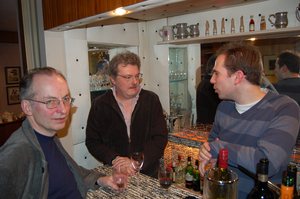
Samizdata’s infamous bar.

Tomas Kohl drops in on us from the Czech Republic.

China’s hottest export.

There’s something important on the computer.

Readers of Brian’s blog are surging.
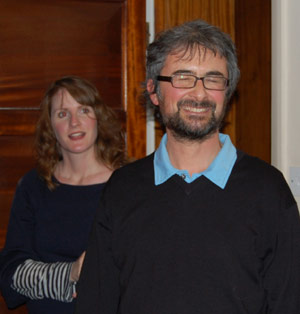
The Briffas – Peter Briffa is the purveyor of the fine Public Interest blog.

By 3:30am, everyone had fallen asleep apart from the guardian hippo.
…or should I say Ron Paul. The previous post makes the case against Ron Paul as a champion of the libertarian faction of the US Republican party.
However, I shall be speaking about the US primary system and what Congressman Paul’s campaign means at the Putney Debates tonight. I shall try to get a summary up over the weekend, either on Samizdata or here. The title of my talk is ‘Change at the Top: How the US Election Process Works and What are the Opportunities for Ron Paul?’ Details from here.
I shall also be continuing to cover the US primaries on my election blog.
The Times yesterday reported on how well the Bible is now doing in China, both for Chinese readers and as yet another manufactured-in-China export:
One book a second glides off the production line at this joint venture between a Chinese Christian charity and the United Bible Societies, a Protestant organisation. Amity has been printing Bibles since 1986. The new factory will have a capacity of one million Bibles a month, increasing the current output by one third.
… Authorities at the officially approved Protestant and Catholic churches put the size of China’s Christian population at about 30 million. But that does not include the tens of millions more who worship in private at underground churches loyal to the Vatican or to various Protestant churches.
Of the 50 million Bibles Amity has printed, 41 million were for the faithful in Chinese and eight minority languages. The rest have been for export to Russia and Africa. Sales surged from 505,000 in 1988 to a high of 6.5 million in 2005. Output last year was 3.5 million and is expected to rise in 2007.
Does this mean that China will behave more nicely in the future than it is behaving now? An American commenter on the above piece reminds us that Christianity and niceness do not always go hand in hand:
After several visits to China I became concinced that if China ever turned ti the God of the Bible, God would bles that nation. It apears that China is turning and God is blessing. Will China become God’s instrument in brnging destruction to a Western Civilization that is becoming increasigly athiest, immoral and blastphemus toward the God of the Bible?
And its spelling has not been improving lately, either.
God will not long toledrate a society that has denigrated His word and His Christ in ways that are so filthy that it is beyond imagining. God is going to judge America and China just might be that instrument. …
Charming.
Speaking as one of the “athiest” and “blastphemus” ones, I do nevertheless concede that Christian congregations scattered around the landscape can do dramatically good things economically. Small groups of mostly decent people, constantly urged to refrain from frivolous consumer spending and to treat each other with kindly and thoughtful reciprocity, can become hugely productive. This in its turn causes others to join in, perhaps for rather less spiritual reasons than those which animated the prime movers, but in ways which also end up improving the newcomers morally, to the general betterment of economic life, among much else. So this process will surely strengthen the Chinese economy, provided only that it is allowed to take root.
But what will then be done with China’s economic strength? Unlike Islam (which positively encourages it), Christianity offers little justification for war making. But by contributing mightily, in the indirect and rather surprising ways described above, to the making of the means to fight wars, it nevertheless does encourage warfare, indirectly. Christian powers have fought wars because they did become, almost in spite of themselves, Christian powers. They fought, in other words, and fight still, because they can.
If a somewhat Christianised China veers away from the warlike pattern set by the West, it will be because the weaponry of all-out war has recently become so much more destructive than was the case when the Christians were fighting most of their wars, rather than because Christianity has become any more persuasive at making people nicer to foreigners of whom they know little.
Many of the Samizdatistas attended the Stockholm Network‘s Golden Umbrella Awards last night, an event that was described to me as the ‘Free Market Oscars’. The intention is to encourage the people working in the varied pro-market think-tanks and advocacy groups around the world by acknowledging their contributions to the cause of liberty.
In truth I attended with moderate expectations as I have struggled to say awake through all too many award ceremonies, but was surprised at how well the event was managed and produced and although it may damage my credentials as a cynic, I thoroughly enjoyed myself.
Helen Disney, the Stockholm Network’s CEO, is one of the most focused and appealing people on the free market scene and her team, such as Tim Evans (who as many of you know, also wears a Libertarian Alliance hat), should be congratulated on managing such a great event. The Master (Mistress, surely?) of Ceremonies was Dr. Karen Horn of the Cologne Institute for Economic Research and former economics editor for Frankfurter Allgemeine Zeitung. She was an outstanding choice, attractive, witty and very engaging, thus setting a wonderful tone for the evening.
The after-dinner speech was delivered by C. Boyden Gray, the imposing US Ambassador to the EU. He is a terrific speaker and I found his less than flattering remarks about the US legal profession most endearing. There was very little to disagree with in his advocacy of reducing limits to free trade and he was frank about how this needs to happen on both sides of the Atlantic.
Another notably good speaker was Ján Čarnogurský, the former Prime Minister of the Slovak Republic. In fact the only speaker who hit the wrong note was Iain Duncan Smith MP, who launched into a defence of his own think-tank, the Centre for Social Justice, although by the time he had finished speaking I still had no idea who he was defending it from or what the hell it actually does.
For details of who won what, see here, but the big winner of the evening was the Bulgarian think tank, the Institute for Market Economics, who walked away with two well deserved prizes. I was also delighted to see the very worthy UK based Taxpayers Alliance come away with an award. The TPA are like a fact-checking ‘urban guerilla’ organisation of thorn-in-the-side activists who have achieved results out of all proportion to the resources at their disposal.
I was quite struck by how young most of the think-tank and activist people in attendance were and that is surely a good thing.
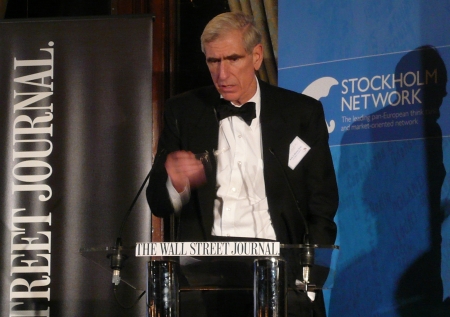
The US Ambassador is an excellent speaker…
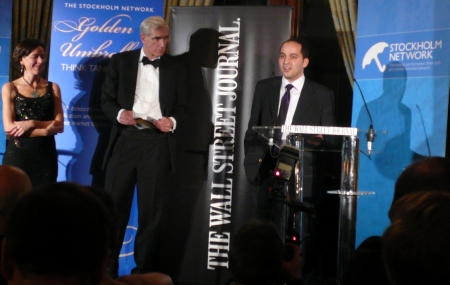
…and he towered over everyone! Seen here with Tural Veliyev of the Free Minds Association of Azerbaijan
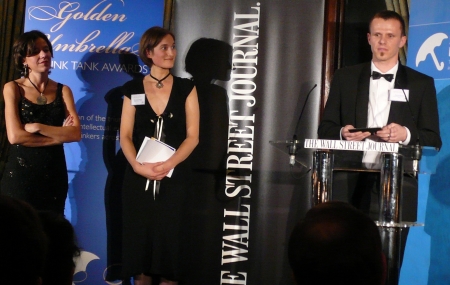
Karen Horn and Cécile Phillipe, presenting an award to Richard Durana of the Institute of Economic and Social Studies in Slovakia
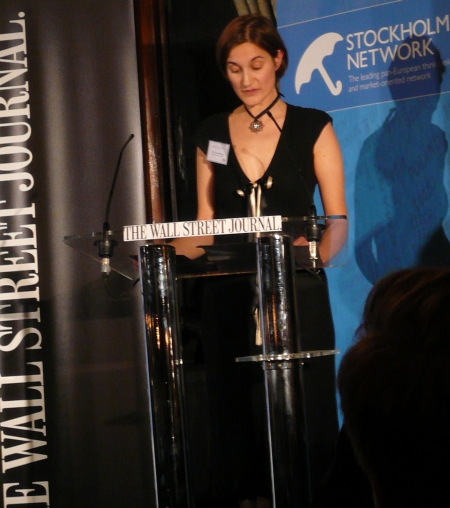
The delightful Cécile Phillipe, Director of the Molinari Economic Institute
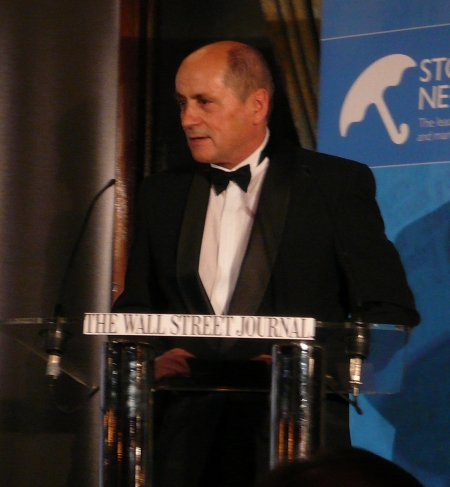
Ján Čarnogurský is also an excellent speaker
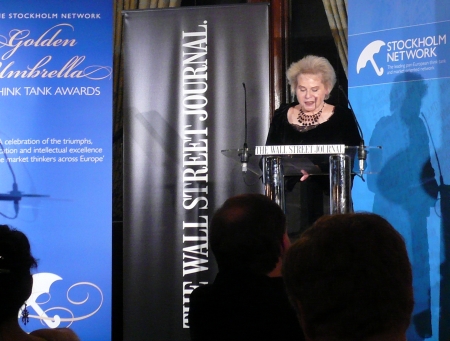
Janet Daly is not someone I often agree with but I found little to disagree with last night
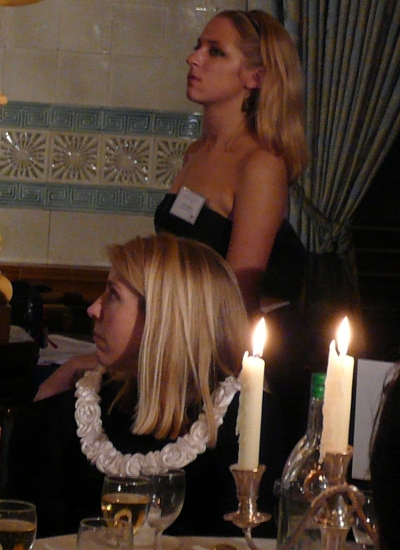
No, I am not going to put up any pictures of Iain Duncan Smith speaking

Big Pharma! Eye Catching Dresses!
Not much bloggage today because the Samizdatistas are… otherwise engaged tonight. We are at the Golden Umbrella Awards.
As we like to remind you every 5th of November, Guy Fawkes was the only man to ever enter Parliament with honest intentions…
|
Who Are We? The Samizdata people are a bunch of sinister and heavily armed globalist illuminati who seek to infect the entire world with the values of personal liberty and several property. Amongst our many crimes is a sense of humour and the intermittent use of British spelling.
We are also a varied group made up of social individualists, classical liberals, whigs, libertarians, extropians, futurists, ‘Porcupines’, Karl Popper fetishists, recovering neo-conservatives, crazed Ayn Rand worshipers, over-caffeinated Virginia Postrel devotees, witty Frédéric Bastiat wannabes, cypherpunks, minarchists, kritarchists and wild-eyed anarcho-capitalists from Britain, North America, Australia and Europe.
|



















